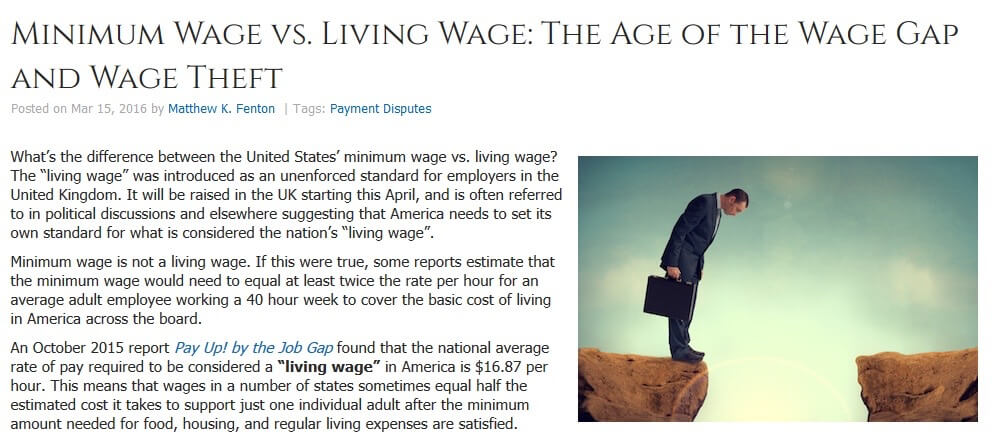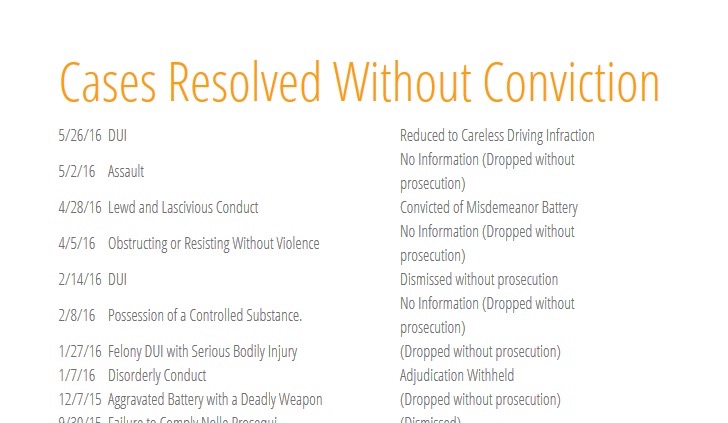Fundamentals of Legal Marketing
As the marketing agency of several law practices, we’ve spent countless hours adapting new legal marketing strategies. Over the course of years, our team has come to understand the basic fundamentals of marketing and branding for lawyers, so now we have this knowledge to present to you in hopes that you may also benefit from a little legal marketing insight.
Proven legal marketing essentials and nonessentials:
Do Use Popular Practice Areas as Keywords
Your biggest website traffic driver as a lawyer is your practice areas. This is where all the attention should be focused when developing the right keywords to use throughout your website. Search engine optimization may be somewhat new to you, but the more “relevance” a search engine bot sees on all your website pages, the more trustworthy you seem, and the more traffic you’re going to get from search engines.
Don’t Waste Time Trying to Build a Social Following
It’s not impossible to get Facebook followers as a lawyer, however, the challenge of legal marketing on social media may not be worth it.
Here are the issues with social media marketing for lawyers:
Your own clients may hesitate to follow you – don’t want to publicize
You open up the need to monitor comments, delete spam, reply, etc.
Your content topics will need to be more generalized to gain traction
If you’ve already set up a Facebook profile for your legal practice, this is essential and still great to have, but how much you post on this page is a whole different story. Let’s address the various reasons why you might run into these problems.

“Being a busy attorney doesn’t leave you a lot of time to keep up with all the current trends of website design, content marketing, social media, ways of search and all other things that our customers find important when looking for an attorney. Keeping us up-to-date and relevant in the social world has been a major improvement for us as a firm.”
– Matthew K. Fenton, Employment & Labor Law Attorney at Wenzel Fenton Cabassa, P.A.
Your own clients may hesitate to follow you – don’t want to publicize.
Legal situations tend to be rather personal. Depending on your legal field or area of practice, you might run into this problem from the start. Divorce, actions against employers, crimes, and various practice areas, despite the positivity the client receives from the final outcome, usually strike plenty of negative emotions in your current clients, and thus are not something people tend to share with the general public. In fact, if a current client is going through a lawsuit, they may not want to share any details, say in a dispute with their current employer to avoid very real consequences, such as losing their job.
You open up the need to monitor comments, delete spam, reply, etc.
The more you post, the more you have to watch your page. If you do work out a content strategy for posting on social media, keep it simple to avoid large volumes of comments that need to be monitored. The problem with posting all the time is that social media is not the most effective place to aggressively market for a lawyer. It deserves less attention, but you should still share your blogs on a regular basis and work out a “light” social media marketing campaign to keep your feed updated at all times. You can still share recent events in a press release-style fashion to keep everyone updated and engaged.
Your content topics will need to be more generalized to gain traction.
Creating blog topics for lawyers is an art form in itself, especially if you’re targeting social media channels. We’ve found that articles related to recent news topics or big issues in relevant legal practice areas tend to do well on a place like Facebook.
For instance, I tested the waters on my personal account to see what would happen by posting this article titled, “Minimum Wage vs. Living Wage: the Age of the Wage Gap and Wage Theft”. The article linked back to an employment law firm in Tampa, and to my surprise, it was shared 30 times altogether and still continues to pull in traffic.

These are pretty decent “organic” numbers for the first attempt on just my personal page, but it all goes back to the fact that anyone, not just clients, can relate to the topic. This is also your “double-edged sword” with Facebook in that “effective” content may not necessarily help you reach search engine queries or the actual pages of potential clients per se, but it will help you build your personal brand and awareness across an audience — which can certainly help with referrals. It also serves as another source of information or way to connect to people who are searching for lawyers in your practice area.
Do Focus on Your Local Audience with Content
Unless you’re prepared to hop a plane for clients (or chat on Skype), stick to your local area. Your local city, county, region, or state should always be used as a keyword throughout your website. It should be attached to the rest of your keywords, such as your practice areas and type of law.
Don’t Build Anything but a Responsive Website
It’s sort of a waste of time and money to build anything other than a responsive web design these days. That’s because, if it’s not responsive, it’s also likely going to be a pain to both build and maintain two entirely separate sites on the backend just so the whole thing works on a smartphone or tablet. The page dimensions tend to change depending on the size/brand of your phone or touchscreen device. This means that programming needs an entire site for each screen size, but there’s an easy way to avoid this costly expense altogether. You need a responsive web design that adapts to every screen size automatically, and all sites will still point back to the same code (computer language on the backend).
Do Hire a Ghostwriter to Improve Search Engine Optimization (SEO)
Most people hear “SEO”, and they automatically think “keywords”. But in fact, you can’t raise your organic ranks without new content. Hiring a ghostwriter to write articles on your behalf, while still maintaining the ability to review, copy edit, and approve content, is the most effective approach to getting a steady stream of clients to your site via content. This means that your ghostwriter will help you produce relevant, specialized, and original quality content that you can approve and post under your attorney or firm name.
Don’t Spend All Your Time Thinking Inside the Box
We’re super impressed sometimes. One thing that really amazes us is the level of ingenuity a single attorney possesses when it comes to marketing to their own audience. You know your clients better than anyone else, and this gives you a huge advantage. Our employment lawyers spoke to a restaurant just outside the EEOC office about having a HUGE sign posted in the window (just across the block) to refer more clients. Strategic local advertising and placement is a beautiful thing.
Do Blog About News, Events, & Educational Topics
Some lawyers are less concerned about the number of people visiting their site than they are about the “quality” of traffic. Relevance helps you target the right audience to reach more quality traffic (potential clients who already qualify to work with you), but when you’re getting too many potential clients, then blogging will help narrow your content for more focused leads.
How to Blog for Potential Clients:
Frequently Asked Questions, Answered
News in Your Specific Area of Legal Practice
Information About Upcoming Changes to Laws
Press Releases About Your Practice
Trending Topics/Current Events
“See if your case qualifies” is not such a good idea, because it may deter clients who actually have a case. This is one tricky part about your content marketing approach in that it is mainly for the purposes of ranking for keywords, targeting, and getting people in the door from search engines.
Don’t Forget to Complete a Brand Image
The purpose of branding is to speak to a potential client’s emotions. This is something that cannot be so easily conveyed in words but relies on text content, imagery, symbols, and familiar ideas that provoke a certain feeling. Above all else, you want potential clients to trust you.
One of the fastest ways to establish trust is by constantly updating a case outcomes page so that people know you are legit and like to win.

Some things that you need to complete your brand image are a style guide (colors, font, a logo), trust seals (Best Lawyers, Super Lawyers, Avvo), original photography, testimonials and reviews from past clients, and a guide to each lawyer’s background, education, and experience. Videos are an amazing way to not only break out into YouTube as a search engine (since it’s the second largest search engine online), but videos can also help you establish a personal connection with clients before meeting in person.
Do Sponsor Ads on Avvo
Regardless of what efforts you spend in other places, pay close attention to your profile on Avvo. This review website for lawyers has been the top referral source for our law firm’s website traffic for the past two years. Your professional profile as a lawyer matters greatly. When people begin searching for a lawyer, they might not find what they’re looking for on the top page of Google, so they sometimes go to a place like Avvo, or a lawyer database, to find a good lawyer in their local area. In addition, Lawyers.com also brings in a ton of traffic and remains the second top source for referrals for our law firms.
Don’t Be Afraid to Tell Your Story
Psychology teaches us that the human brain is hardwired to respond to storytelling. Humans tend to connect with emotions much easier than sheer logic, and they have no problem putting themselves in someone else’s shoes as long as the narrative is in story format. Telling your story will help potential clients understand you better, and aid them in making the decision to work with you (sometimes over another lawyer).
Our employment law firm is made up of attorneys who are aggressive advocates for employee rights (they do not represent employers) and knowing their story and attitude toward justice is encouraging to someone who is in a tough situation with an employer. Your story helps potential clients gauge your capabilities and even your personality, which will give them the “okay” on working with you.
Is it time for a legal marketing overhaul or a new website?
Our digital marketing agency has experience creating content marketing campaigns, responsive websites, and branding collateral for a number of lawyers in Florida. If you need advice on the best approach as an attorney or firm, get a free consultation by calling Oyova — a St. Petersburg web design, content marketing, social media management, and e-commerce web development company.
